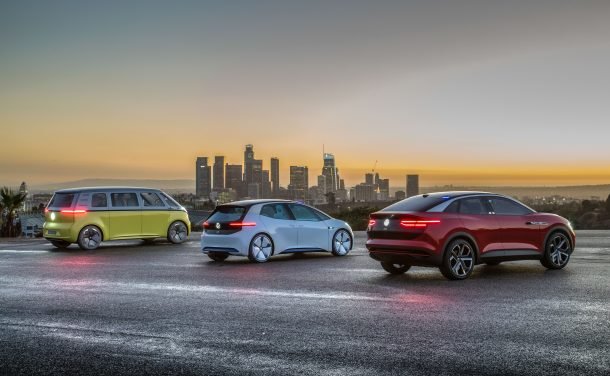You Won't Have to Buy One of Volkswagen's Upcoming Electrics to Drive One

A product onslaught with a questionable sales future is on the way from Volkswagen, but Americans, as well as Europeans, won’t necessarily have to purchase one to add it to their lifestyle.
Under its “We Share” ride sharing venture, Volkswagen plans to offer up its line of I.D. electric vehicles to urbanites who don’t own a car, but still wish to use one from time to time. Users won’t have to worry about a disappearing tax credit, that’s for sure.
The service comes online in Berlin in the second quarter of 2019. Starting out, VW plans to offer 1,500 e-Golfs and 500 smaller, European-market EVs that go by the name “e-up!” (Such names always bring out the rage in us.) In 2020, models from the I.D. family join those earlier electrics in the We Share fleet, as the service expands to other cities.
Like its revenue stream-seeking rivals, VW sees big growth potential in the ride sharing market.
It’s hoped that an early, no-pressure taste of “e-mobility” (aka driving an electric car) will help familiarize the population with the vehicles and their merits. Hopping into a VW EV will be as easy as opening an app on your phone and locating an available car — after paying an undisclosed fee, of course. Down the road, it’s hoped that some of these adopters add an electric VW to their lives full-time.
“We want to motivate young, urban users to engage with e-mobility,” said Jürgen Stackmann, Volkswagen’s brand board member for sales, in a statement. “The people of Berlin will be the first to enjoy the electrifying experience of our ‘We Share’ car sharing offering.”
From there, the automaker plans to roll out the service in other European and North American cities in 2020 — the year the first of the I.D. models enters showrooms. While the initial hatchback I.D. model isn’t expected stateside, others are. Among them, a crossover (I.D. Crozz) and a reborn Microbus (I.D. Buzz), both expected to enter production at VW’s Chattanooga assembly plant. Americans see the Crozz first, in 2020, with the Buzz arriving in 2022.
Managing the ride sharing venture is UMI Urban Mobility International, a VW subsidiary. The automaker claims its North American rollout will “primarily” target cities with populations of over one million.
[Images: Volkswagen]

More by Steph Willems
Latest Car Reviews
Read moreLatest Product Reviews
Read moreRecent Comments
- Spectator Wild to me the US sent like $100B overseas for other peoples wars while we clammer over .1% of that money being used to promote EVs in our country.
- Spectator got a pic of that 27 inch screen? That sounds massive!
- MaintenanceCosts "And with ANY car, always budget for maintenance."The question is whether you have to budget a thousand bucks (or euro) a year, or a quarter of your income.
- FreedMike The NASCAR race was a dandy. That finish…
- EBFlex It’s ironic that the typical low IQ big government simps are all over this yet we’re completely silent when oil companies took massive losses during Covid. Funny how that’s fine but profits aren’t. These people have no idea how business works.



































Comments
Join the conversation
I hear VW is working on a fusion powered model they plan to call the F-up.
Speaking of names that REALLY didn't sell: American Motors Pacer Gremlin American Motors Hornet Javelin American Motors